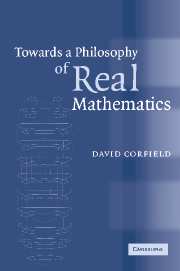Book contents
- Frontmatter
- Contents
- Preface
- 1 Introduction: a role for history
- PART I HUMAN AND ARTIFICIAL MATHEMATICIANS
- PART II PLAUSIBILITY, UNCERTAINTY AND PROBABILITY
- PART III THE GROWTH OF MATHEMATICS
- 7 Lakatos's philosophy of mathematics
- 8 Beyond the methodology of mathematical research programmes
- 9 The importance of mathematical conceptualisation
- PART IV THE INTERPRETATION OF MATHEMATICS
- Appendix
- Bibliography
- Index
9 - The importance of mathematical conceptualisation
Published online by Cambridge University Press: 22 September 2009
- Frontmatter
- Contents
- Preface
- 1 Introduction: a role for history
- PART I HUMAN AND ARTIFICIAL MATHEMATICIANS
- PART II PLAUSIBILITY, UNCERTAINTY AND PROBABILITY
- PART III THE GROWTH OF MATHEMATICS
- 7 Lakatos's philosophy of mathematics
- 8 Beyond the methodology of mathematical research programmes
- 9 The importance of mathematical conceptualisation
- PART IV THE INTERPRETATION OF MATHEMATICS
- Appendix
- Bibliography
- Index
Summary
A mathematician, like a painter or a poet, is a maker of patterns. If his patterns are more permanent than theirs, it is because they are made with ideas.
(Hardy 1940: 24)All these difficulties are but consequences of our refusal to see that mathematics cannot be defined without acknowledging its most obvious feature: namely, that it is interesting.
(Polanyi 1958: 188)VALUES IN MATHEMATICS
As with any academic community, mathematicians must devote a significant part of their time to promoting their research activities. This occurs both externally, with a view to improving the standing of mathematics relative to other disciplines, and internally, with a view to establishing the importance of specific research programmes. What is very noticeable when one encounters such promotion exercises is the enormous variety of qualities alluded to and the differences in emphasis placed on these qualities. Even if, as seems to be the case, a considerable consensus has persistently taken certain moments in the history of mathematics to be pivotal, importance does appear to be a time-dependent notion. Something vitally important for one generation may not seem quite so crucial for the next. But, alongside these rather predictable variations between generations of mathematicians, one also finds considerable dissimilarities between mathematicians of any given era. We would expect, then, that an exploration of contrasting opinions about what constitutes an important advance would reveal much about the evolution of competing images of mathematics and the tensions existing between them.
- Type
- Chapter
- Information
- Towards a Philosophy of Real Mathematics , pp. 204 - 232Publisher: Cambridge University PressPrint publication year: 2003



